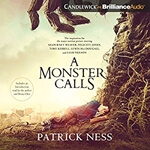
 A Monster Calls
A Monster Calls
By Patrick Ness; Narrated by Jason Isaacs
4 hours [UNABRIDGED]
Publisher: Brilliance Audio
Publication Date: 23 September 2011
Tags: / YA / fantasy / monsters / nightmares / illness /
The monster showed up after midnight. As they do. But it isn’t the monster Conor’s been expecting. He’s been expecting the one from his nightmare, the nightmare he’s had nearly every night since his mother started her treatments, the one with the darkness and the wind and the screaming…. This monster, though, is something different. Something ancient, something wild. And it wants the most dangerous thing of all from Conor. It wants the truth. Patrick Ness spins a tale from the final story idea of Siobhan Dowd, whose premature death from cancer prevented her from writing it herself.
Darkly mischievous and painfully funny, A Monster Calls is an extraordinarily moving novel about coming to terms with loss from two of our finest writers for young adults.
This book is inspired by an idea from author Siobhan Dowd (4 February 1960 – 21 August 2007). Patrick Ness was granted the opportunity to explore these ideas, and soon ideas gave way to other ideas, which yielded this book. There’s a terrific interview that follows the audiobook reading wherein Ness discusses the writing process and challenges he faced in such an undertaking. Ness successfully sidesteps weighty sentiment and delivers emotional authenticity while allowing room for empathy, and it is for these reasons that this book resonates long after reading.
The writing is clean and the story is as deep and layered as you wish it to be. Don’t let the young protagonist fool you. This isn’t your generic YA plastic-wrap fantasy story packed with breathless bubblegum adventure and paint-by-number characters. There are monsters and there is loss. The emotion is real, and Ness allows enough room for empathy to turn, to circle like an unquiet animal that knows the end isn’t far. Couple this with genuine wisdom, and we have a story that demands attention, that successfully spans that artificial genre-based boundary to shake reader out their slumber.
Jason Isaacs narrates the audiobook, and conducts the follow-up interview with Patrick Ness at the book’s conclusion. Isaacs nails the reading. In my opinion the audiobook is flawless, and Isaacs never makes himself known to the listener, rather he is a conduit, something only the very best readers manage to pull off. Too many contemporary audiobook narrators perform the text when all they need to do is get out of the way and read. Thank you, Jason Isaacs.
Posted by Casey Hampton
